Avakaya | Avakai (Andhra Mango Pickle)
A pickle made of mangoes is something that has takers in almost every nook and corner of India. Thus, has variations from region to region. Just like this Andhra Mango Pickle, which is lovingly called as Avakaya or Avakai or Avakaya Pachadi. This uber essential version is made with unripe, green mangoes and is spicy and robust – just like Andhra cuisine. The Avakaya is rightly one of the gems of this famous regional cuisine.
About Avakaya Recipe
Although Indian summers are really tough to handle, with temperatures soaring every year, the arrival of mangoes with it bring a certain joy as well.
We use mangoes in a variety of dishes – everything from beverages, salads and curries to the quintessential pickles and other condiments.
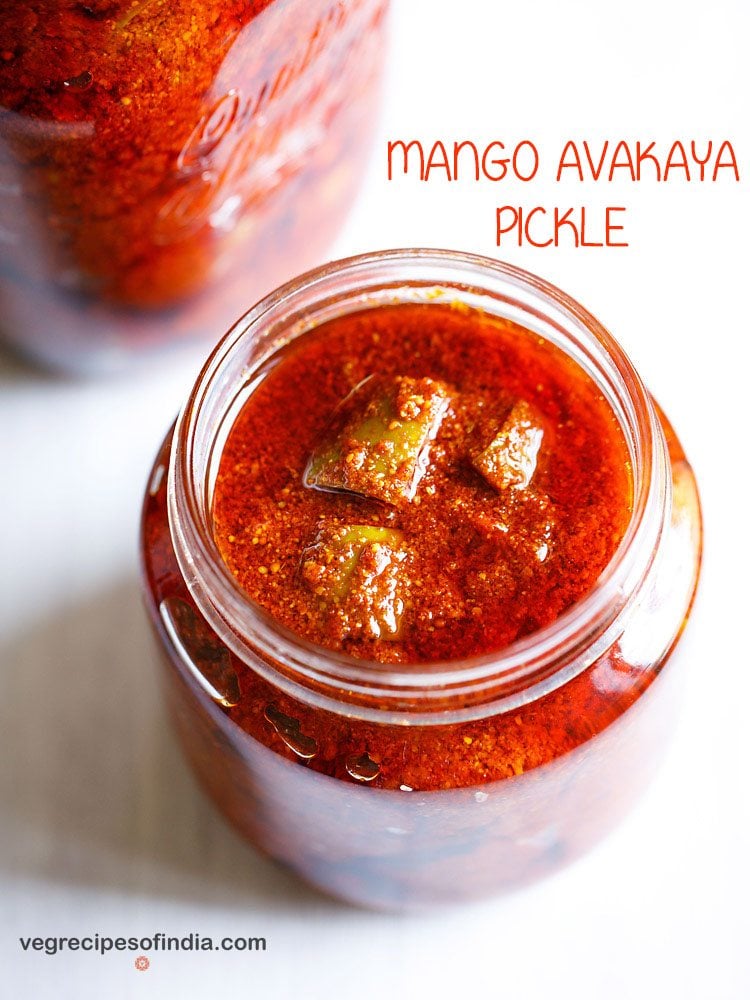
The same goes for me. Summer means a lot of homemade pickles, syrups and squashes. While I usually end up making this Punjabi Mango Pickle, but it is this Avakaya too that’s quite popular in my home.
The word ‘Avakaya’ is a fusion of two words – Ava and Kaya. The word ‘Ava’ refers to mustard seeds and ‘Kaya’ is for raw fruit or unripe mango here for this pickle. This pickle is also known by the name Avakaya Pachadi.
When for the first time I made this pickle, for the method, I referred to the websites Sailu’s Food and Gayatri Vantillu.
However, the quantities for the ingredients in this pickle are mine. I’ve made sure that there’s a balance of pungency, heat, saltiness and spiciness in this Andhra Mango Pickle.
Pickling may need your time and patience in the beginning. But, once you get the hang of it and some experience, it is not rocket science at all!
Thus, you should try this recipe of Avakai too, as it is very easy to make. Take care of the cleanliness and moisture bit in everything – mangoes, crockery and cutlery used – and go ahead with it.
Keep the prepared pickle mixture in nice sunlight for best results. If not, it can be kept in a dry place as well. These proportion of ingredients will yield about 2 kg of pickle, which lasts for 6 months to a year. Halve the recipe if you wish to.
This Avakai tastes just lovely with any Indian meal; or just dal-steamed rice, Curd Rice and even parathas.
Prepping Mangoes
It is a no-brainer that this Avakaya recipe turns out the best with the use of fresh, unripe, firm and green mangoes.
However, chopping of these mangoes can be a difficult and daunting thing as the kernel part needs to be intact.
So, it is best to get the mangoes for this pickle chopped into pieces from a vendor. In India, it is a common practice by the vegetable vendors or farmers. Thus, getting chopped mangoes for Avakaya Pachadi is quite easy.
Just in case you plan to prep the mangoes at home, then use a sharp knife as slicing through the hard kernels require some pressure and good knife skills. It can be risky. So, while using it, be very careful too.
As I’m trained to handle knives, I prepped the mangoes for my pickle recipe at home. I used a sharp chef’s knife to chop the green mangoes.
Traditionally, an Indian cutter or chopper is used. I must say that there’s a certain joy in this too. But then, you must, must be alert while doing so and be very careful.
If the vegetable vendor has chopped the mangoes, then wipe clean each of the chopped mango pieces with a clean and dry cotton kitchen napkin.
Avakai Do’s and Don’ts
- Working Space: Your working space to make the pickle, should be absolutely clean and dry.
- Cleanliness: You should always use clean and dry spoons, bowls and pans. Sun-drying them is a good option.
- Hygiene: Your hands should be clean and there should be no moisture in your them. Remove any rings and keep your nails clean and trimmed.
- Fresh Produce: The mangoes that you use for this pickle have to be unripe, green and with a firm flesh. Don’t use semi-ripe or ripe mangoes. Keeping the kernel attached to the mango pieces helps in the long shelf-life of this pickle.
- Quantities: Refer to the quantities of the ingredients just as they are mentioned in the recipe. Avoid adding less as some of them aid in the preservation process.
- Substitutes: As an alternative to chickpeas or chana, you may use 3 tablespoons peeled garlic cloves. In place of sesame oil, you may use sunflower or peanut oil.
- Jars: Use glass jars, ceramic jars or the Indian ceramic jar called “bharni” to store the pickle. Kindly do not use plastic jars even if you make a small quantity of avakai.
How to make Avakaya
Prep Spices
1. First, begin by sun drying 200 grams mustard seeds (1 cup + 4 tablespoons) for a day or at least for 4 to 5 hours. This is to get rid of any dampness or moisture in them.
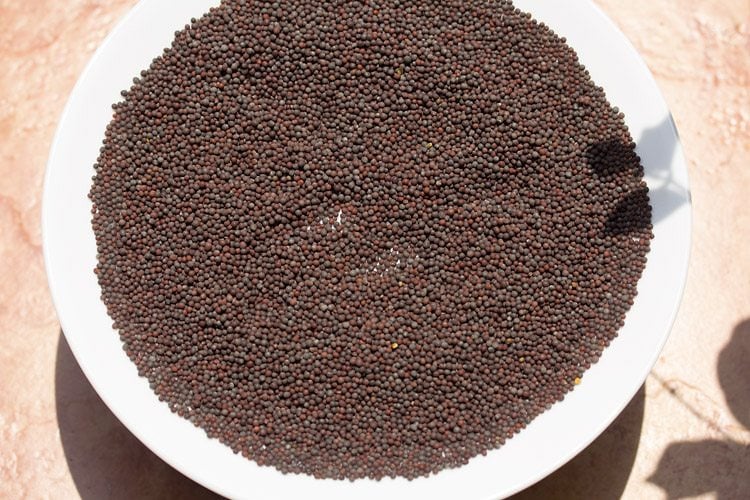
2. Also, sun dry 2 tablespoons fenugreek seeds (methi dana) and 200 grams red chili powder (or 2 cups) for 4 to 5 hours.
I sun dried the entire pack of fenugreek seeds and used only 2 tablespoons from it.
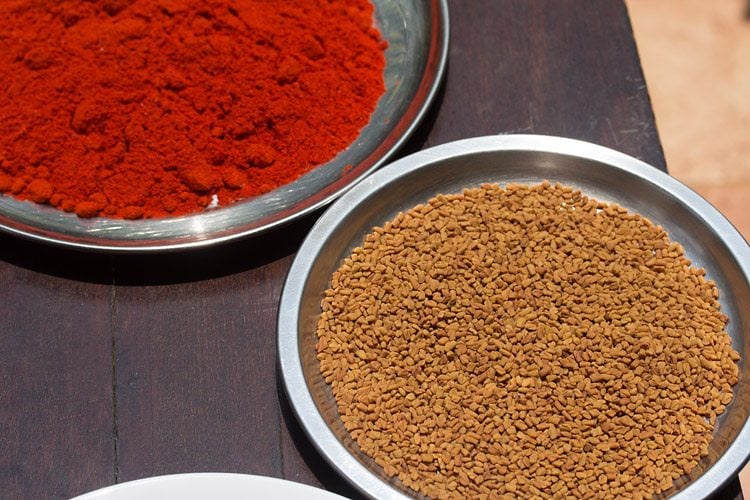
Chop mangoes
3. Soak the unripe mangoes in water for 1 hour. Then, rinse them well and if there is any sticky sap which has dried on the mangoes, rub the mangoes in your palms when rinsing to remove the dried sap.
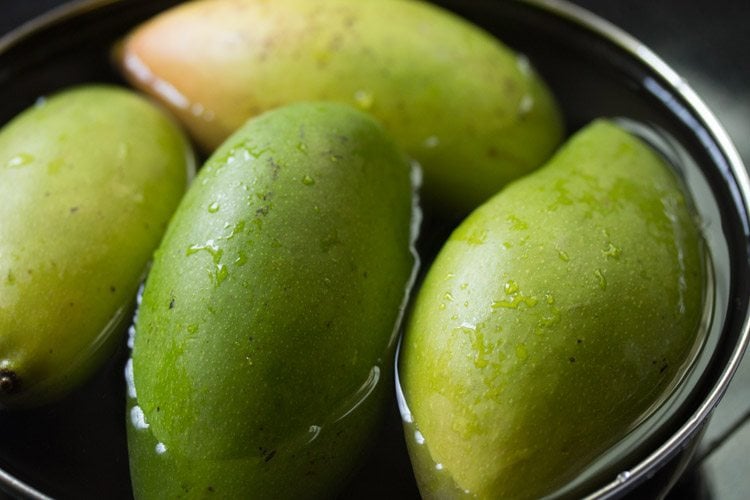
4. Then, remove the mangoes. Dry them with a clean kitchen towel or naturally.
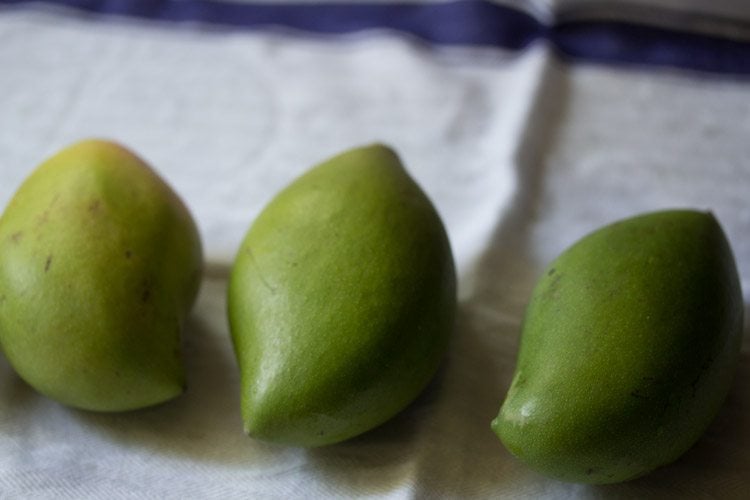
5. Before chopping mangoes, they should be completely dry. First, slice the mango in halves from its center.
This is very difficult as the kernel is hard and the knife does not cut it easily. So please avoid, if you cannot do this.
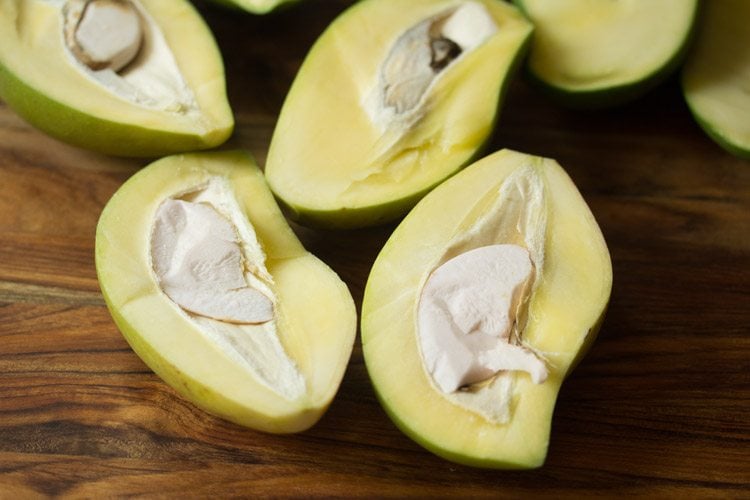
6. Then, take each halve and remove the seeds carefully with a knife. Now, halve the mango vertically from the center first. Then, cut horizontally. The kernel part will be intact in the mangoes.
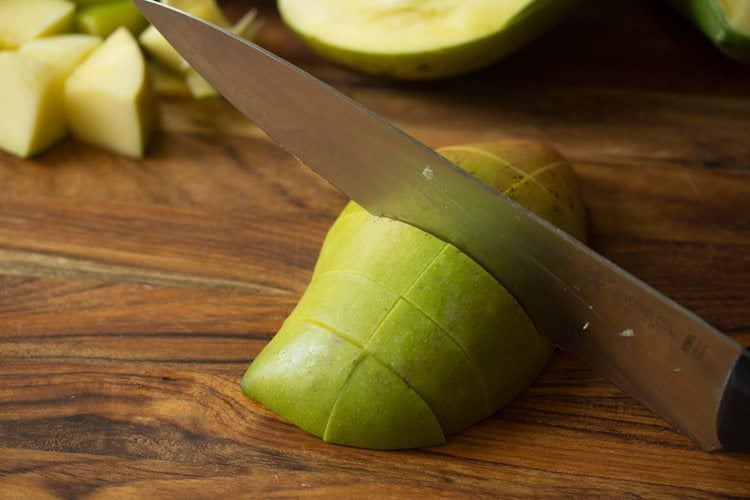
7. Take the mango pieces and remove the thin paper like covering from the kernel part with a spoon or with your hands. Make sure that your hands are clean.
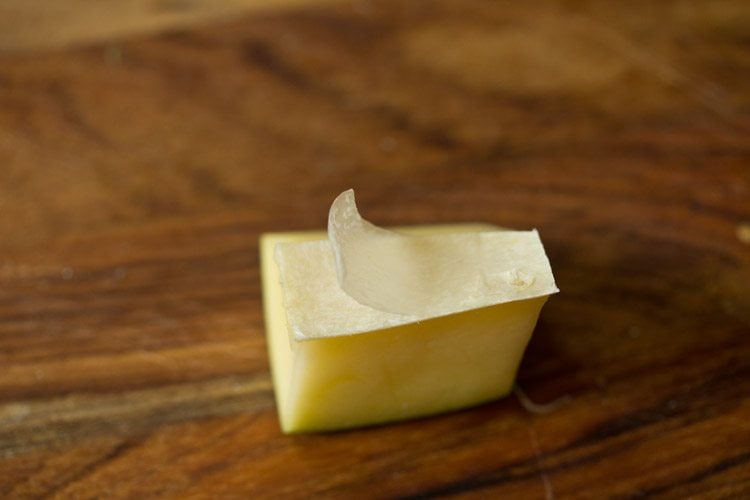
8. Take the chopped mangoes in a large pan or bowl. Cover and keep aside. If using chopped mangoes got from the vegetable vendor, then wipe them clean with a kitchen towel.
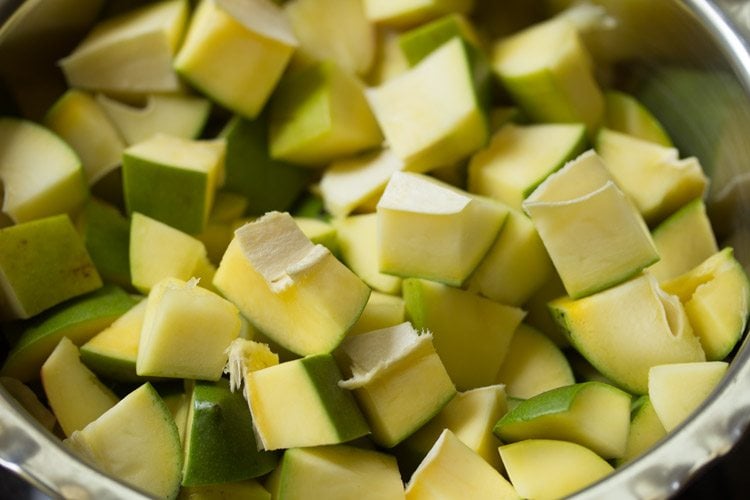
Make Avakaya Pachadi
9. Add mustard seeds in a grinder jar. They should be warm (from sun drying), before you grind them.
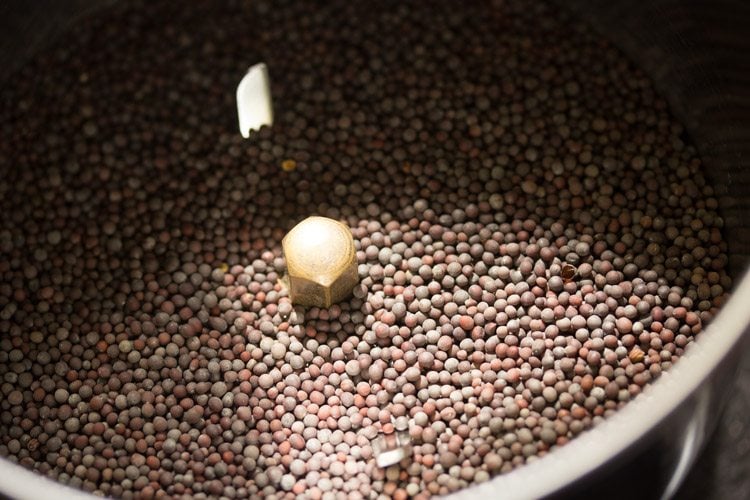
10. Grind to a semi-fine powder.
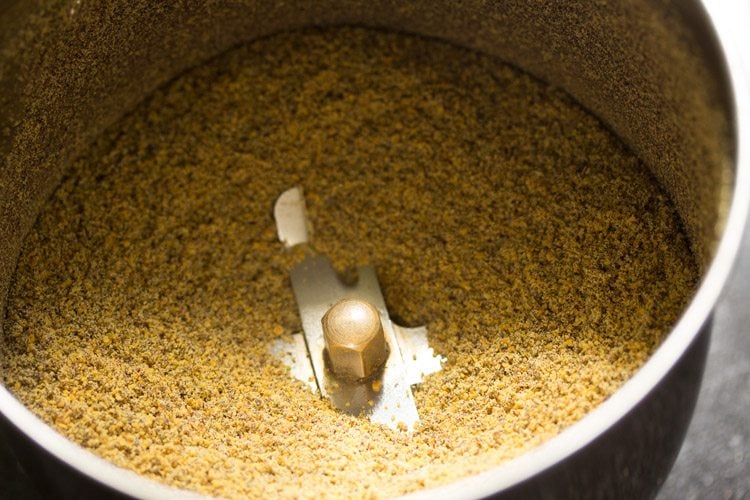
11. Remove the mustard powder and add to mango pieces.
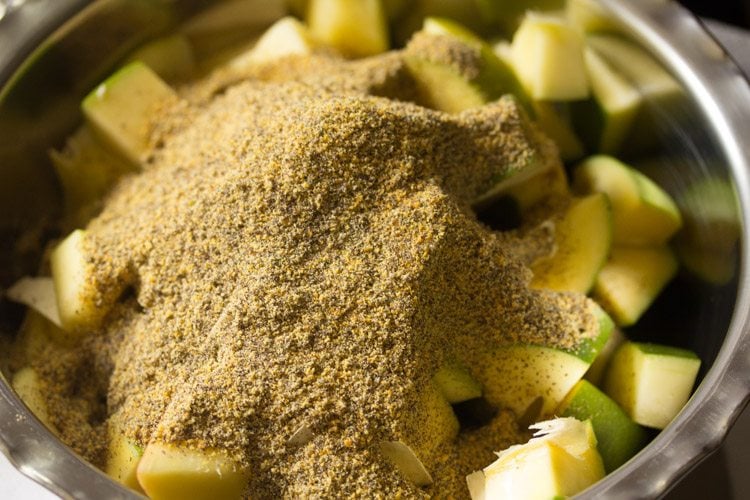
10. In the same grinder jar, add fenugreek seeds.
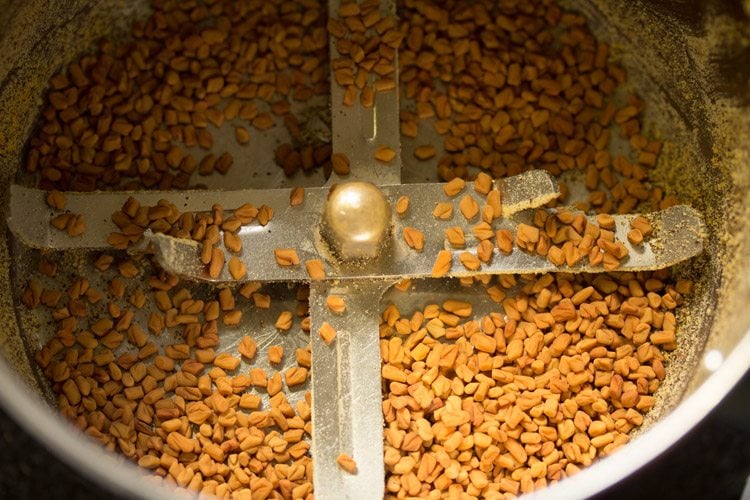
11. Grind to a semi-fine powder.
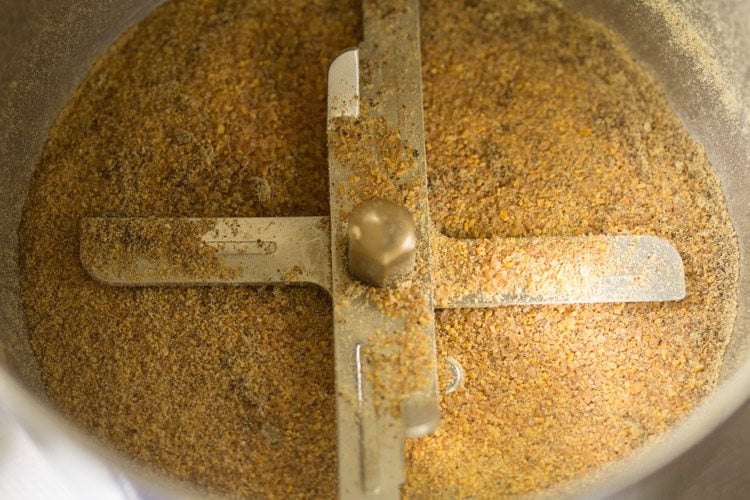
12. Add the fenugreek powder to the mango pieces.
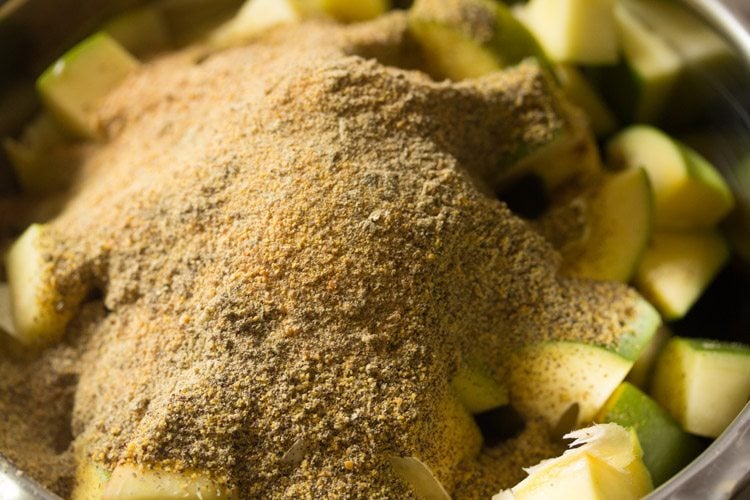
13. Now, add the red chili powder. I have used Kashmiri red chili powder. You can also use byadagi red chilli powder instead.
Keep in mind the spiciness and pungency of the red chilli powder you will be using as this can result in the avakai becoming very spicy.
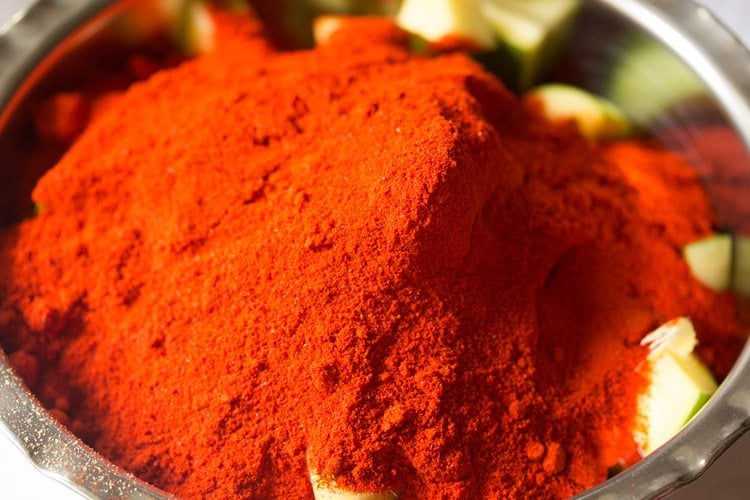
14. Add 3 tablespoons white chickpeas (chana). You can also use 3 tablespoons peeled garlic cloves instead of chickpeas.
Also, add 200 grams rock salt (1 cup). You can even use sea salt crystals or Himalayan pink salt. Use salt which is non iodized. If using sea salt crystals, then powder in a mixer and then add.
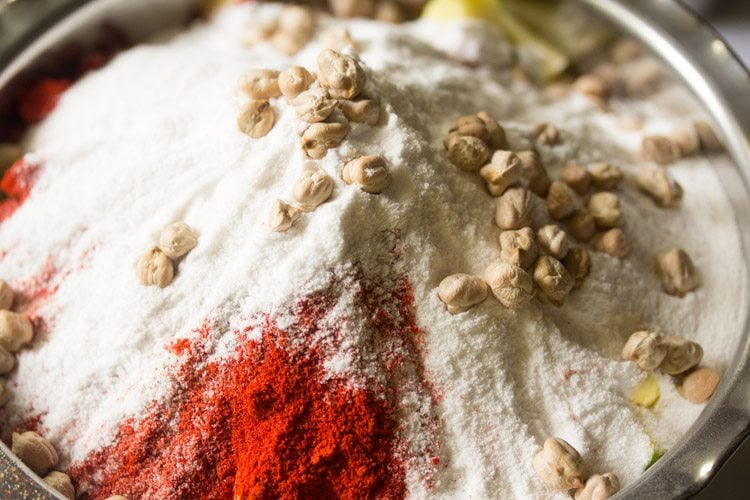
15. Mix very well with a large spoon.
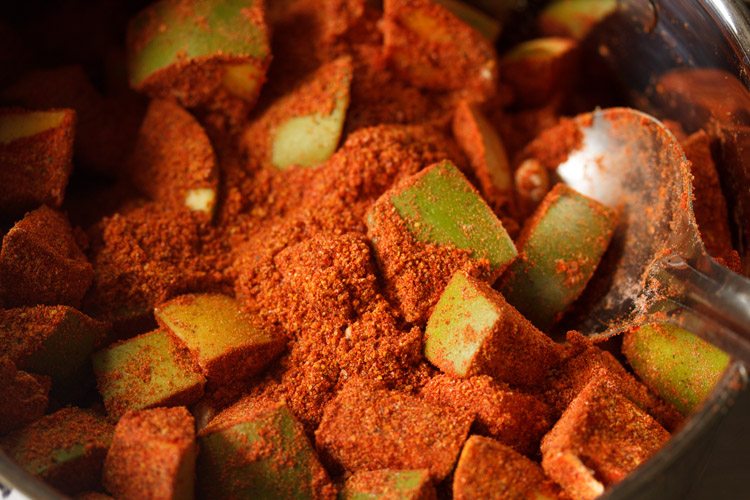
16. Add 3 tablespoons turmeric powder and mix very well.
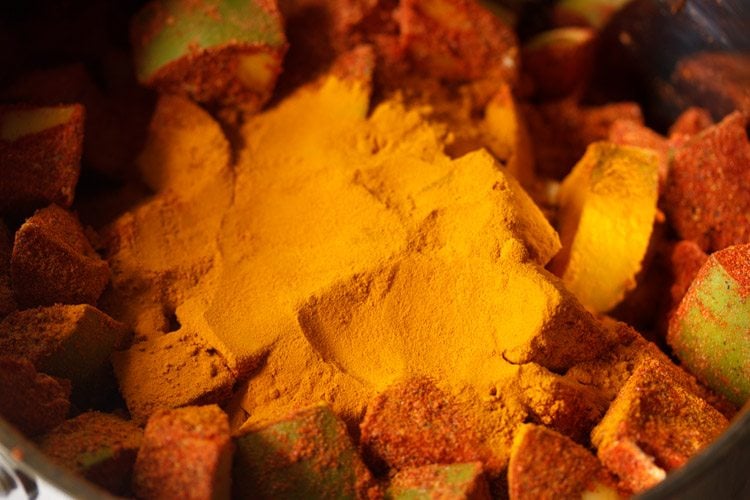
17. Now, add 500 ml sesame oil/gingelly oil (2 cups). Use cold pressed sesame oil (kachchi ghani) and not refined sesame oil.
If you do not have sesame oil, you can also use peanut oil or sunflower oil.
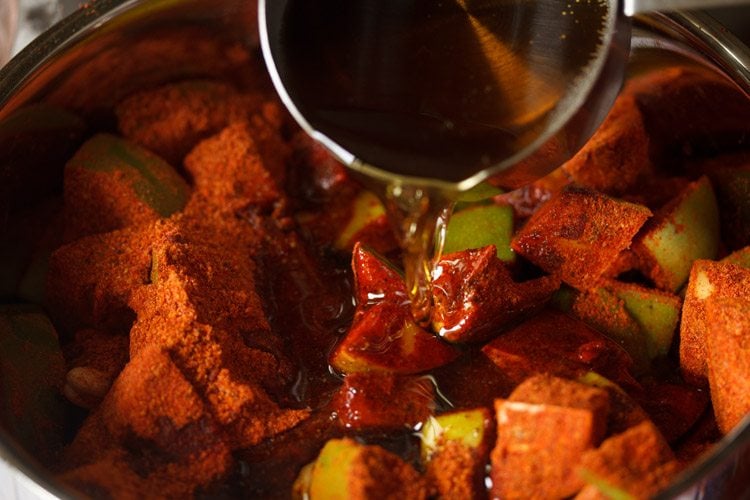
18. Mix very well with a large spoon. Taste the pickle masala and check for salt.
If the pickle tastes slightly more salty, then its fine. The extra saltiness goes away as the pickle matures. But if there is less salt, then add some salt in the pickle and mix again.
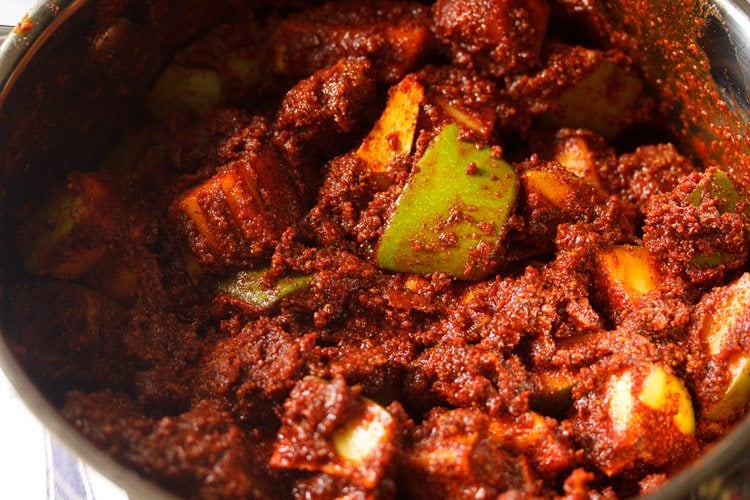
19. Cover with a lid (not tightly) and keep the Avakai in a dry place for 4 to 5 days. You can also keep in sunlight for a few hours on these 4 to 5 days.
Alternatively, you can even add the mango mixture in a glass or ceramic jar.
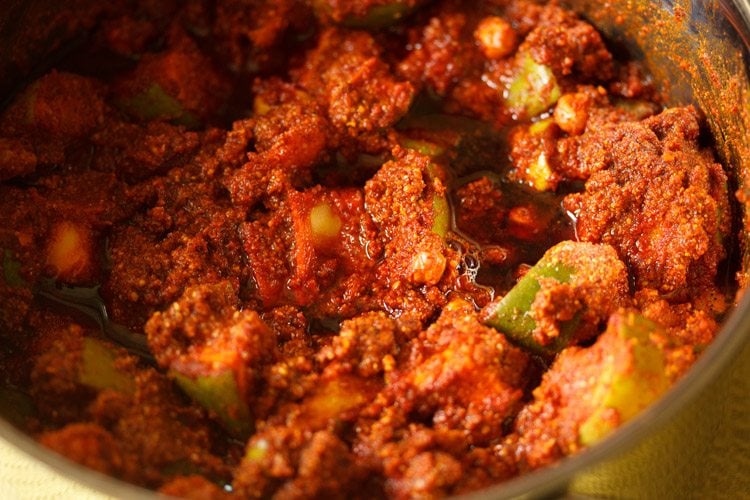
20. Everyday or alternate day, remove the lid and mix the pickle with a clean dry spoon. You can sun dry the spoon for some minutes before you mix the pickle.
On the fourth or fifth day, you will see oil floating on top of the pickle and the mango pieces would have already softened. Mix again with a clean spoon.
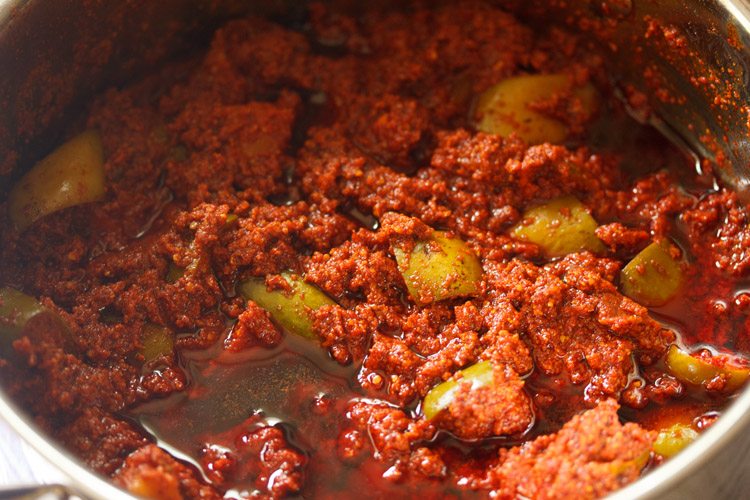
21. Add the pickle in a clean jar or bottle. Wash, rinse and sun dry the glass jar or bottle before storing the pickle. I kept the bottles for one day in the sun.
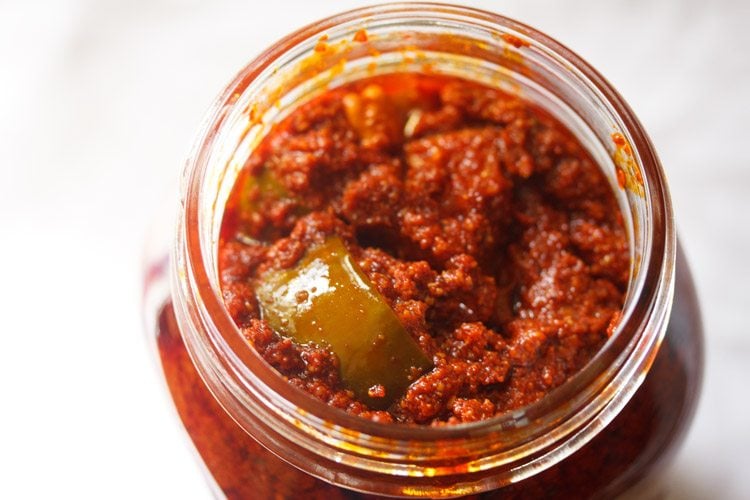
22. Pour some sesame oil in the pickle jar, which just covers the pickle on top by 1.5 to 2 inches. Close the lid and refrigerate.
You can even keep the Avakaya Pachadi in a dry place for 2 to 3 days more and then refrigerate.
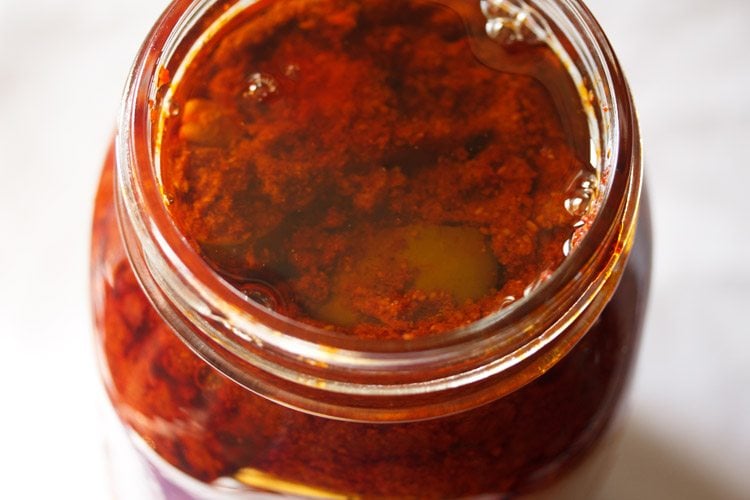
23. When using this Avakaya Pachadi, remove the portion you want in a small jar from the main jar and then serve with your everyday meals.
If the oil on top becomes less, then add some more sesame oil, so that the pickle is covered with oil.
Serve Avakai with any Indian meal. You can even have it with steamed rice, curd rice and paratha.
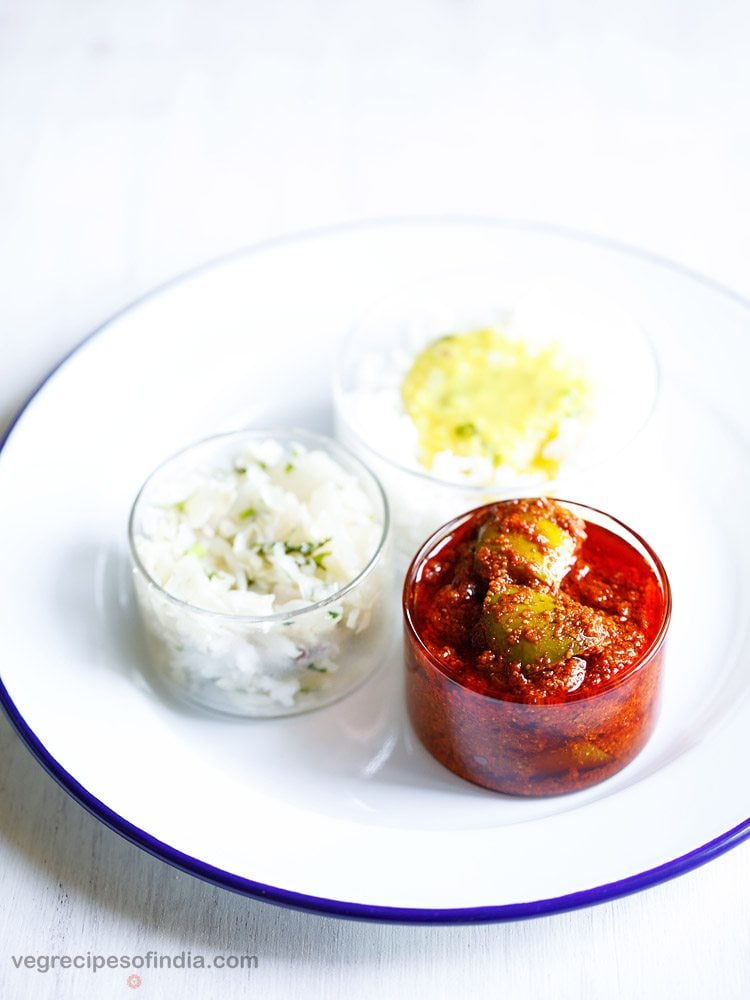
FAQs
How long can I store this pickle?
Refrigerate and keep it good for a year.
I forgot to grind the sea salt before adding in this pickle, and it is still undissolved after about 2 weeks. How do I overcome this?
You just need to wait for some more days or weeks till the salt granules dissolve.
My pickle turned bitter. Is there any way that I can rectify this?
You can let the pickle mature for some days, like a week or 10 days. Hopefully, the bitterness will mellow down like this.
What kind of mangoes are most apt to make this Avakaya Pachadi?
You should use mangoes that are firm, green and sour, and not semi-ripe, ripe or with a yellow or yellowish-green skin.
There should be no sweetness in the mangoes, what so ever. Also, while buying, make sure the mangoes are blemish free or with a few blemishes.
Should I heat the oil before adding to the mango mixture?
No, you can add the oil directly without heating.
What can possibly cause bitterness in the avakai pickle?
The bitterness in this pickle can be due to the use of excessive fenugreek seeds. So stick to the amount mentioned in the recipe.
Should the chana added in this pickle recipe be consumed? Isn’t it hard?
Yes, the chana should be eaten. Chana absorbs the oil, masala and the flavors from the pickle. Thus, becomes soft (but not very soft like cooked chana) and tastes delicious.
More Similar Recipes To Try:
- Mango Murabba
- No Oil Sweet Mango Pickle
- Mango Pickle (Punjabi Style)
- Kadumanga Achar (Kerala Style)
Step by Step Photo Guide Above
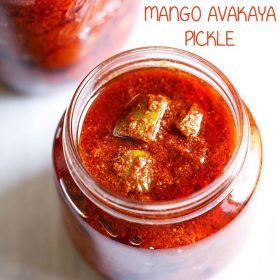
Ingredients
- 1 kg unripe mangoes or 8 cups chopped mangoes
- 200 grams mustard seeds or 1 cup + 4 tablespoon mustard seeds
- 20 grams fenugreek seeds or 2 tablespoon fenugreek seeds (methi dana)
- 200 grams kashmiri chilli powder or 2 cups kashmiri red chili powder – can use any variety of red chilli powder instead
- 200 grams rock salt (edible and food grade) or 1 cup rock salt or pink salt
- 40 grams white chickpeas or 3 tablespoons
- 3 tablespoon turmeric powder (ground turmeric)
- 2 cups sesame oil (gingelly oil) – cold pressed or wood pressed
Instructions
Preparation
- First, begin by sun drying the mustard seeds for a day or for at least 4 to 5 hours. This is to get rid of any dampness or moisture in them.
- Also, sun dry fenugreek seeds and red chili powder for 4 to 5 hours.
- Meanwhile, soak the unripe mangoes in water for 1 hour.
- Then, rinse them well and if there is any sticky sap which has dried on the mangoes, rub the mangoes in your palms when rinsing to remove the dried sap.
- Remove the mangoes. Dry them with a clean kitchen towel or naturally.
Chopping mangoes
- Before chopping mangoes, they should be completely dry. There should not be any trace of moisture or water on the mangoes.
- Firstly, slice the mango in halves from its center. This is very difficult as the kernel is hard and the knife does not cut it easily. So please avoid, if you cannot do this chopping.
- Then, take each halve and remove the seeds carefully with a knife. The kernel part will be intact on the mangoes.
- Now, halve the mango vertically from the center first. Then, cut horizontally.
- This chopping is also difficult, so avoid if you cannot do this. The mango should be chopped into bite size pieces.
- Take the mango pieces and remove the thin paper like covering from the kernel part with a spoon or with your hands. Make sure that your hands are clean.
- Take the chopped mangoes in a large pan or bowl. Cover and keep aside.
Making avakaya pachadi
- Take the mustard seeds. They should be warm before you grind them.
- Add in a mixer or grinder-jar or a spice grinder and grind to a semi fine powder. Remove the mustard powder and add to mango pieces.
- In the same jar, add fenugreek seeds.
- Grind to a semi fine powder and add to the mango pieces.
- Now. add the red chili powder.
- Add the white chickpeas.
- Add rock salt. You can even use sea salt crystals or Himalayan pink salt. Use salt which is non iodized. If using sea salt crystals, then powder in a mixer and then add.
- Mix very well with a large spoon.
- Add turmeric powder and mix very well.
- Now, add sesame oil or gingelly oil. Use cold pressed sesame oil (kachchi ghani) and not refined sesame oil.
- Mix very well and thoroughly with a large spoon.
Storing avakai
- Cover with a lid (not tightly) and keep the mango Avakaya in a dry place for 4 to 5 days.
- You can also keep in sunlight for a few hours on 4 to 5 days. Alternatively, you can even add the mango mixture in a glass or ceramic jar.
- Everyday or alternate day, remove the lid and mix the pickle with a clean spoon. You can sun dry the spoon for some minutes before you mix the pickle.
- On the fourth or fifth day, you will see oil floating on top of the pickle and the mango pieces would have already softened. Mix again with a clean spoon.
- Add the pickle in a clean jar or bottle. Do wash the glass jar or bottle and then sun dry it for a day before storing the pickle.
- Pour some sesame oil in the pickle jars which just covers the pickle on top by 1.5 to 2 inches.
- Close the lid and refrigerate. You can even keep the pickle in a dry place for 2 to 3 days more and then refrigerate.
Serving avakaya pachadi
- When serving avakai, remove the portion you want in a small jar from the main jar and then serve with your everyday meals. If the oil on top becomes less, then add some more sesame oil, so that the pickle is covered with oil.
- Serve Avakaya pachadi with any Indian meal. You can even have it with steamed rice, curd rice and paratha.
Notes
- Make sure to use mangoes that are unripe, green and with a firm flesh. Do not use semi-ripe or half-ripe mangoes.
- Use fresh spices and sun dry them before using.
- It is best to get the mangoes cut from the vendor or farmer from where you buy if you cannot manage chopping them on their own. Chopping unripe mangoes with hard kernels can be risky, so be careful.
- Wipe clean each of the chopped mango pieces (when chopped by the vendor) with a clean and dry cotton kitchen napkin.
- Take care to note the spiciness and pungency of the red chilli powder you will be using as this may make your avakaya very spicy. Instead of kashmiri red chilli powder you can also use byadagi red chilli powder.
- The approximate nutrition info is for the entire 2 kilogram of pickle.
Nutrition
This avakaya or avakai recipe post from the archives first published in May 2017 has been updated and republished on April 2023.

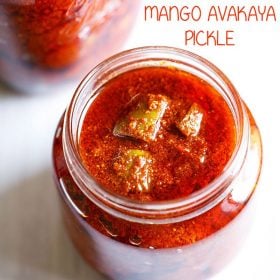
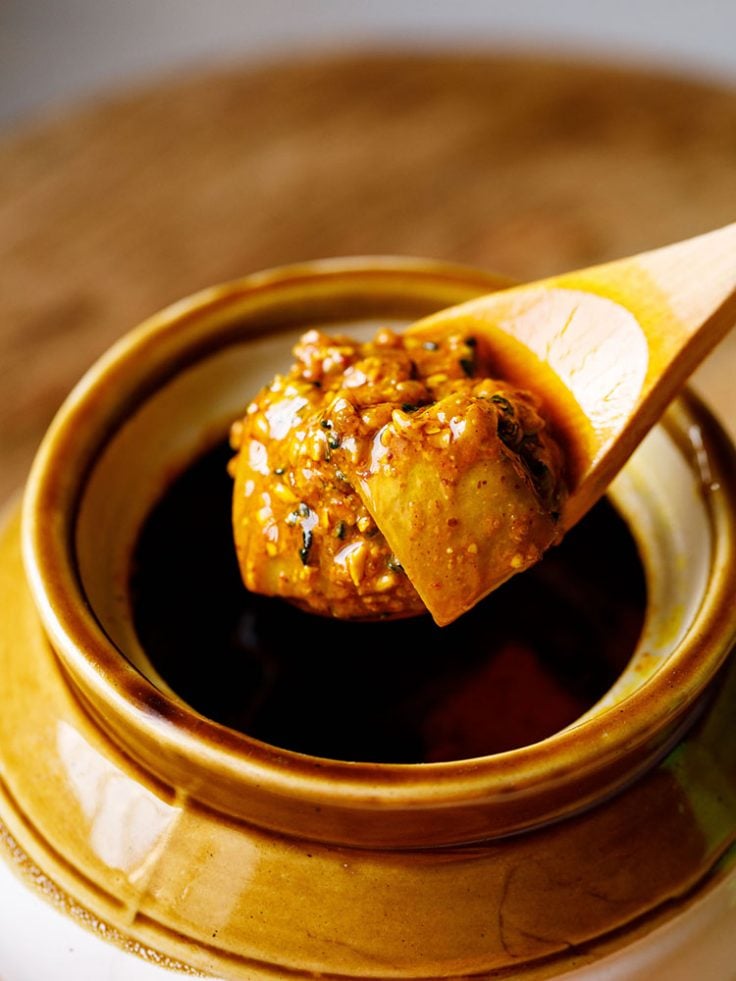
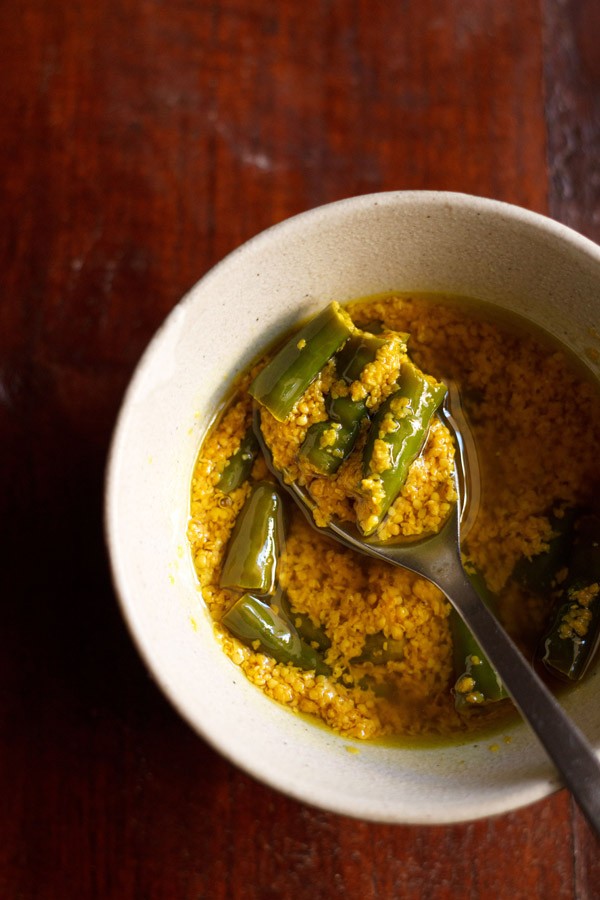
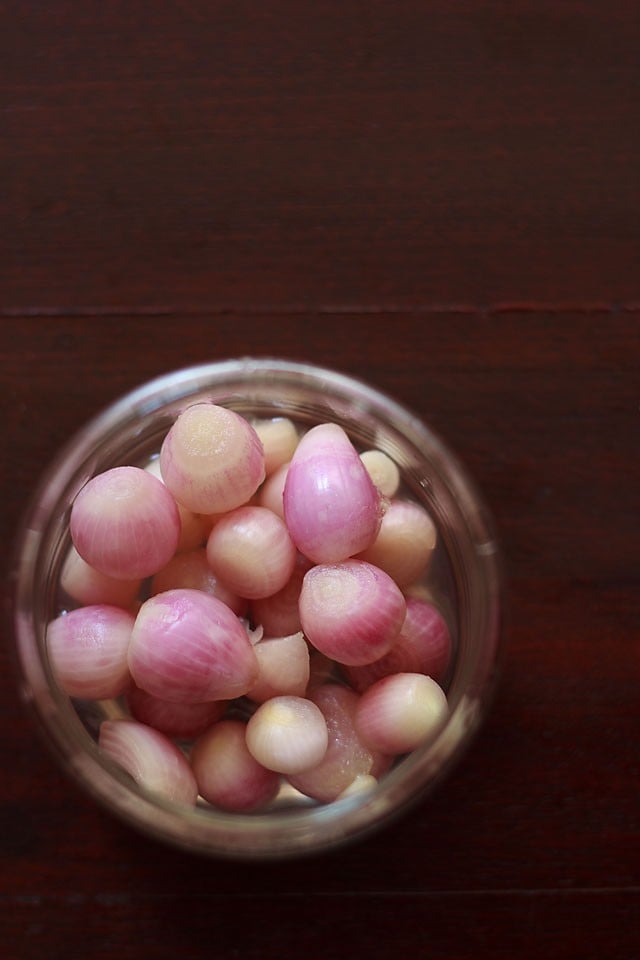
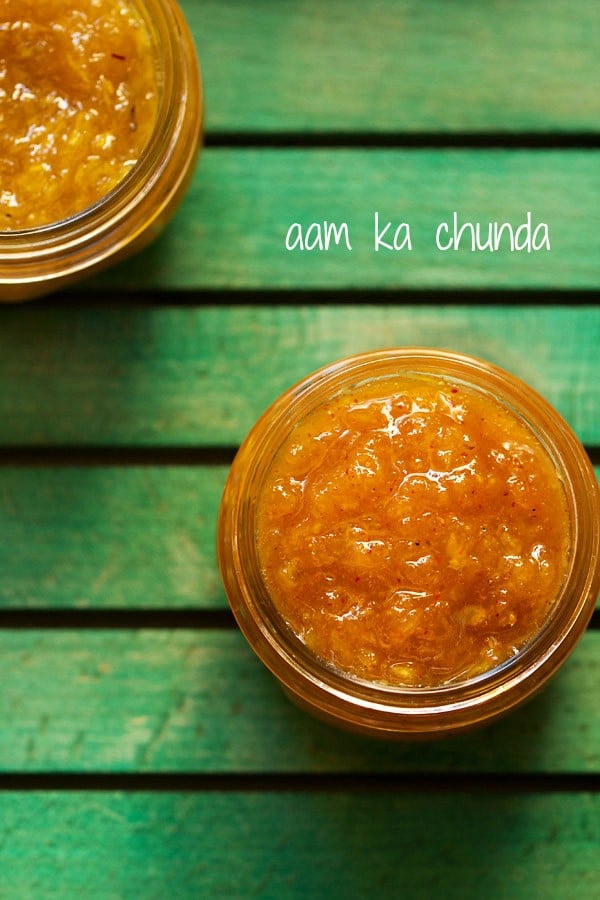
Good.
Thank you.
I don’t see a mention of how the chickpeas are added to the pickle.
The step of adding chickpeas is mentioned in both the step-by-step photos and the recipe card. Please do have a look again.
Hi Dassana. I am planning to try this recipe. What’s the shelf life of the pickle if stored at room temperature? Thank you.
It can stay up to a year at room temperature. Keep in a dry, cool and moisture-free place.
Make sure to transfer the pickle a small portion of the pickle from the main jar to a smaller glass jar for everyday usage.
Use a clean dry spoon for transferring the pickle and ensure that the pickle is always covered with a layer of sesame oil.
Following these tips will increase the shelf life of pickle. I hope this helps.
Why use chickpeas in this pickle?
You can skip adding them if you do not prefer. Traditionally in some variations chickpeas are added to Avakaya.
Hi Dassana, thanks for this lovely recipe. What is the shelf life of this pickle if stored in the fridge?
Welcome Meera. It will stay good for more than a year in the fridge.
Hi
I tried the mango Avakkai and the taste is awesome
However I did. a mistake and did not grind sea salt before adding it…its been 2 weeks now and salt remains undissolved. Pleae let me know if I can do something about it
I don’t think anything can be done. The only thing that can be done is to wait for some more days or weeks till the salt granules dissolve.
Hi,
I tried this recipe but unfortunately it became bitter in the taste because of excess quantity of mustard seeds.(added by mistake)So now is their any way out to overcome that excessive bitterness of the pickle.
Just let the pickle mature for some days – say a week or 10 days and hopefully the bitterness will get mellowed and reduce. If not, then adding some sour ingredient like lemon juice or vinegar can help.
This recipe is awesome. I made it twice this month. One variation is I added jaggery when I made 2nd time. Both tasted so good. Thanks a lot!!!
You always rock, been using your recipes from 2 years and it is always success at home
thank you ratna for this lovely feedback on andhra avakaya pickle. i am glad that the recipes have always been a success. keeps me motivated to add more recipes.
Hi! Should the oil be heated before pouring in the mango micture or just as is right out of the bottle?
no need to heat the oil. you can measure and pour it directly.
Hi dassana
Love your recipes so much.
I have a question my achar tastes bitter. I followed exact recipe. What do you think have gone wrong? Mustard seeds(Rai) makes it bitter?? Or should I use sarsaun seeds.
thanks fatima. rai does not make it bitter. bitterness could be due to methi seeds. give some more time for the flavors to mature and i am sure the bitterness will reduce gradually.
Hi Dassana! I’m making your green chillies pickles and would love to prepare this pickle too. I had some questions in mind: 1) Is it possible to cut the mango not in halves, right on the kernel, but on the sides of the kernel? Is it important to keep a piece of kernel on the mango’s slices? 2) What kind of mango is the most appropriated for this preparation? Is it supposed to be rather a sweet or sour variety? Thank you very much. It’s like my exploration of your recipes will never end 🙂
molina, the mangoes are have the kernel part as it helps in the pickle staying for a long time. but if you cannot manage, then you can cut the mango from the sides of the kernel. if you cannot manage then you can remove the kernel part from the mango slices.
the mangoes to be used should be firm, hard and green and sour. do not use mangoes which are semi-ripe or ripe or with a yellow or yellowish-green skin. the flesh should be firm and sour. try to buy mangoes which are blemish free or with few blemishes. only sour mangoes are used to make avakaya. there should no sweetness in the mangoes, not even a faint sweet and sour taste. hope this helps.
Hi Dassana. Thanks for the wonderful recipe. I got the mangoes chopped from a local vendor, later I had to wash them as they were not clean after being chopped. I have dried them by spreading them on a sheet at room temp. Now, can the moisture (that might still be retained after drying) affect the pickle? What can be done to prevent it?
arina, dry them well at room temp under a fan. you can even dry them in sunlight for a few hours, so that the moisture is not there. if you dry properly, the moisture will not be there. at room temp, dry for a day and then you can start making the pickle.
hi Dassana! awesome masala makes an awesome pickle.
the masala is perfect.did not miss the hing at all.u’ve managed to strike that balance in spices & the taste (u r naturally gifted though & u know it)
I had halved the recipe & had to reduce the amt of salt since I was using sea salt crystals plus also reduced the amt of haldi( the one I use is quite strong).but the taste is great.
thank u for this recipe. I am glad I tried it.this recipe is a keeper.
true meveera and yes hing is not missed at all. do check the taste on salt after 4 to 5 days. if you feel the salt is less, then do add some more. salt helps in preserving the pickle along with oil. haldi can be skipped also. also do make sure that the pickle is covered with 1 to 1.5 inches of sesame oil. do give a stir once in two to three weeks if you have used a large jar. lastly thanks for sharing the feedback.
Ooooh so yum. The spicy oil from pickle and hot rice is food of the gods 🙂
You’ve written add chana, is it supposed to be eaten or discarded at the time of eating the pickle? Won’t it be hard?
thanks preeti. chana is supposed to be eaten. chana absorbs the masala, oil and all the flavors from the pickle. thus it softens and tastes very good when you bite into it. its not hard. it does become soft, but not very soft like cooked chana.
Awesome Dasanna.. the other day I was searching in your blog for this recipe and now I see you added it.. will surely try this..
thanks seema. the post was pending for many days. i was going to add it almost a week back, but have been facing a terribly slow internet for the last 5 to 6 days. so used mobile internet and added the post as summers will be over soon. do try. its a really good mango avakaya recipe.
Hi.
In certain recipes you mentioned the recipe could be halved or doubled.in the other ones you say it’s tricky doing it.could you probably mention the logic of adding a particular spice in a recipe so that we know how to triple or halve that recipe.when your instructions are followed the T the recipe is yummy.can a guideline be issued for doubling or halving
instead of leaving it to our experience.?
sharada, in some recipes the ingredients can be halved or doubled easily. these recipes fall in those category of recipes where everything is about the a standard proportion of ingredients. examples would be idli, dosa, chillas, pickles, ice creams, puddings, sooji halwa (sheera), rice based dishes like pulao, fried rice, noodles, pasta, parathas, bread, pooris, sandwiches, cutlets, patties, samosa, sweets like boondi ladoo, gulab jamuns, rasgulla, kaku katli etc. in these recipes proportions of ingredients work like 4:1 proportion of rice and urad dal for idli batter. so in these recipes you can easily halve or double the ingredients.
in some recipes, a standard or a fixed proportion does not work. most gravy, dal, curry and chutney recipes will fall in this category. here since spice powders are used, along with other ingredients, doubling or tripling can affect the balance of the dish and ruin its flavors. eg a chana masala instead of tasting great, can taste too sour, oily or spicy or even have an acidic like taste. so in such recipes, the ingredients have to be eye balled and added. here the method of andaaz or approximation works. this method to add the ingredients precisely comes from experience. cooking is an art, but it also contains experience and practice. so this a novice cannot do. continous cooking at home will bring this experiences. also cooking is related to the heart. so if a food is made lovingly and creatively, then the heart guides, the feelings and intuition guide. hope this helps.